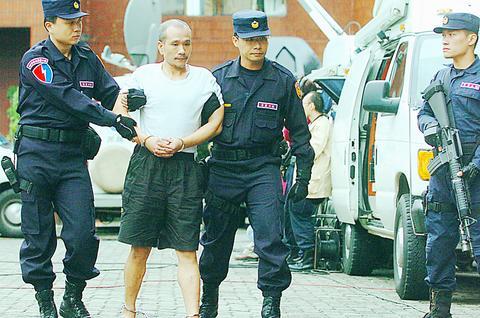Two of the nation's most wanted fugitives, Chen Yi-hua (陳益華) and Hsueh Chiu (薛球), were extradited from China yesterday, arriving in Taipei to stand trial after more than three years on the run, according to the Criminal Investigation Bureau.
"Chen and Hsueh's extradition represents the government's determination in fighting crime and protecting citizens' lives and property," said Minister of the Interior Su Jia-chyuan (

PHOTO: SEAN CHAO, TAIPEI TIMES
Su also made clear that cross-strait cooperation in the extradition of criminals was not based upon cash rewards. The Executive Yuan has in the past offered rewards for the capture of the nation's most wanted fugitives, and a reward of NT$10 million had been approved for the capture of the two fugitives. The minister, however, dodged the question of whether the Chinese police would be rewarded for their help in the arrest of Chen and Hsueh.
"The Chinese police authorities have not requested the reward, but according to regulations, we are obliged to reward an informant who aids in the capture of a fugitive. We will proceed in accordance with our regulations," Su said.
Su also took the opportunity to warn against attempting to avoid the long arm of Taiwanese justice by escaping to China.
"To the 326 fugitives who have yet to be arrested, cross-strait cooperation on crime will make it impossible to escape the forces of law by escaping to China," Su said.
Chen and Hsueh were captured and detained by Chinese police in July in Xiamen. The whereabouts of the two fugitives was revealed when they attempted to blackmail Yang Teng-kuei (楊登魁), owner of the GTV cable TV station, for NT$50 million while they were in Xiamen. According to authorities, Chen and Hsueh had taken refuge in China in November of last year.
The two returned to Taiwan in accordance with the Kinmen Agreement of 1990 that sets out guidelines for cross-strait extradition of criminals. They were transported by ship to the outlying island of Matsu before being flown to Taipei and arriving at the Criminal Investigation Bureau at 3:30pm yesterday afternoon.
Chen and Hsueh had been arrested by Miaoli police in March 21, 2000, but they were released the same day by the Miaoli District Court on bail of NT$300,000 and NT$200,000 respectively. They have been on the run since.The two built their notoriety on a string of high-profile kidnappings, including that of Taichung City Council Vice Speaker Chang Hung-nien (
In addition, the two are wanted on charges of armed robbery on several counts, including a raid of the military's Hsinchu financial office in January 2001, during which the two got away with NT$ 2.2 million.

AIR SUPPORT: The Ministry of National Defense thanked the US for the delivery, adding that it was an indicator of the White House’s commitment to the Taiwan Relations Act Deputy Minister of National Defense Po Horng-huei (柏鴻輝) and Representative to the US Alexander Yui on Friday attended a delivery ceremony for the first of Taiwan’s long-awaited 66 F-16C/D Block 70 jets at a Lockheed Martin Corp factory in Greenville, South Carolina. “We are so proud to be the global home of the F-16 and to support Taiwan’s air defense capabilities,” US Representative William Timmons wrote on X, alongside a photograph of Taiwanese and US officials at the event. The F-16C/D Block 70 jets Taiwan ordered have the same capabilities as aircraft that had been upgraded to F-16Vs. The batch of Lockheed Martin

GRIDLOCK: The National Fire Agency’s Special Search and Rescue team is on standby to travel to the countries to help out with the rescue effort A powerful earthquake rocked Myanmar and neighboring Thailand yesterday, killing at least three people in Bangkok and burying dozens when a high-rise building under construction collapsed. Footage shared on social media from Myanmar’s second-largest city showed widespread destruction, raising fears that many were trapped under the rubble or killed. The magnitude 7.7 earthquake, with an epicenter near Mandalay in Myanmar, struck at midday and was followed by a strong magnitude 6.4 aftershock. The extent of death, injury and destruction — especially in Myanmar, which is embroiled in a civil war and where information is tightly controlled at the best of times —

China's military today said it began joint army, navy and rocket force exercises around Taiwan to "serve as a stern warning and powerful deterrent against Taiwanese independence," calling President William Lai (賴清德) a "parasite." The exercises come after Lai called Beijing a "foreign hostile force" last month. More than 10 Chinese military ships approached close to Taiwan's 24 nautical mile (44.4km) contiguous zone this morning and Taiwan sent its own warships to respond, two senior Taiwanese officials said. Taiwan has not yet detected any live fire by the Chinese military so far, one of the officials said. The drills took place after US Secretary

THUGGISH BEHAVIOR: Encouraging people to report independence supporters is another intimidation tactic that threatens cross-strait peace, the state department said China setting up an online system for reporting “Taiwanese independence” advocates is an “irresponsible and reprehensible” act, a US government spokesperson said on Friday. “China’s call for private individuals to report on alleged ‘persecution or suppression’ by supposed ‘Taiwan independence henchmen and accomplices’ is irresponsible and reprehensible,” an unnamed US Department of State spokesperson told the Central News Agency in an e-mail. The move is part of Beijing’s “intimidation campaign” against Taiwan and its supporters, and is “threatening free speech around the world, destabilizing the Indo-Pacific region, and deliberately eroding the cross-strait status quo,” the spokesperson said. The Chinese Communist Party’s “threats